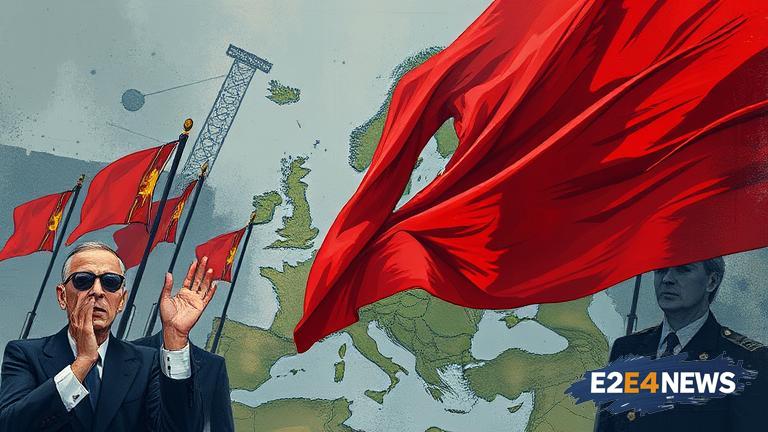The geopolitical landscape of Europe is undergoing significant changes, with rising tensions between Russia and several European countries, including Finland, Estonia, Latvia, Lithuania, and Poland. These nations, once part of the Soviet sphere of influence, have been strengthening their ties with Western Europe and NATO, a move that has been met with resistance from Russia. The situation has led to concerns over the emergence of a new Iron Curtain, a term coined during the Cold War to describe the physical and ideological divide between Eastern and Western Europe. The current tensions are fueled by a range of factors, including Russia’s annexation of Crimea, its support for separatist movements in Ukraine, and its military buildup along the borders of NATO member states. In response, NATO has been bolstering its presence in the region, with increased troop deployments and military exercises. The European Union has also been taking steps to strengthen its relationships with these countries, including the provision of economic and political support. However, despite these efforts, the situation remains volatile, with ongoing skirmishes and diplomatic tensions between Russia and its neighbors. The implications of a new Iron Curtain are far-reaching, with potential consequences for regional stability, global security, and the future of European integration. As the situation continues to unfold, it is clear that the fate of Europe hangs in the balance, with the potential for a new era of division and conflict. The historical context of the original Iron Curtain, which divided Europe during the Cold War, serves as a stark reminder of the dangers of such a divide. The current situation is further complicated by the role of other global powers, including the United States and China, which are seeking to exert their influence in the region. The economic implications of a new Iron Curtain are also significant, with potential disruptions to trade and investment flows between East and West. Furthermore, the humanitarian consequences of such a divide should not be underestimated, with the potential for increased migration and social unrest. In addition, the environmental impact of a new Iron Curtain could be substantial, with the potential for decreased cooperation on issues such as climate change and energy security. The cultural implications of such a divide are also noteworthy, with the potential for decreased exchange and cooperation between nations. As the international community seeks to navigate this complex and rapidly evolving situation, it is clear that a comprehensive and coordinated approach will be required to mitigate the risks and promote a more stable and secure Europe. This will involve a range of measures, including diplomatic engagement, economic support, and military cooperation. The role of international organizations, such as the United Nations and the European Union, will be critical in this regard. Ultimately, the fate of Europe will depend on the ability of its leaders to navigate the complex web of geopolitical tensions and promote a more cooperative and integrated region. The emergence of a new Iron Curtain would have far-reaching consequences for the global economy, international relations, and the future of European integration. It is imperative that leaders on both sides of the divide work towards a more constructive and cooperative relationship, one that promotes mutual understanding, respect, and cooperation. The situation is complex and multifaceted, requiring a nuanced and sophisticated approach. As the world watches with bated breath, it is clear that the future of Europe hangs in the balance, with the potential for a new era of division and conflict. The international community must come together to promote a more stable and secure Europe, one that is characterized by cooperation, integration, and mutual respect. The consequences of failure would be severe, with the potential for a new era of division and conflict. It is imperative that leaders on both sides of the divide work towards a more constructive and cooperative relationship, one that promotes mutual understanding, respect, and cooperation. The situation is complex and multifaceted, requiring a nuanced and sophisticated approach. As the world navigates this critical juncture, it is clear that the fate of Europe will depend on the ability of its leaders to promote a more cooperative and integrated region.
